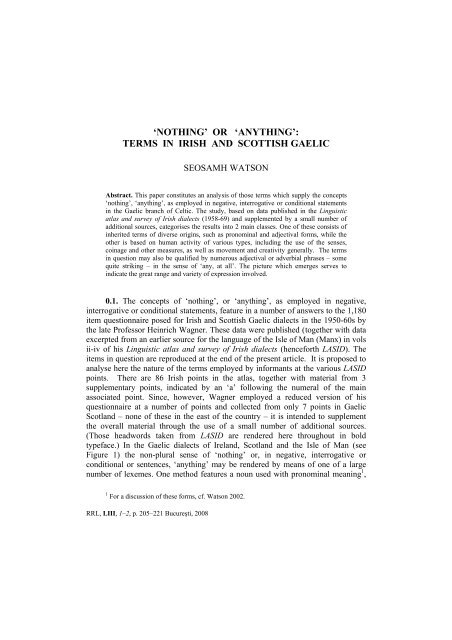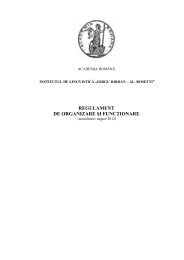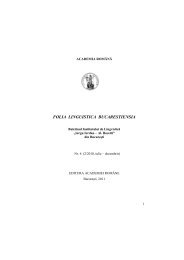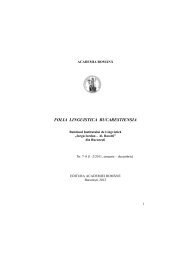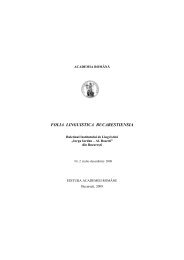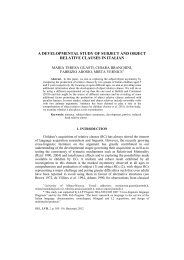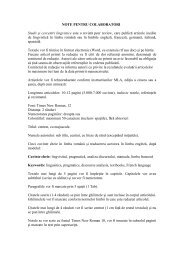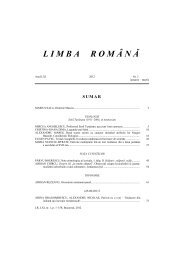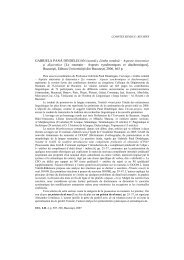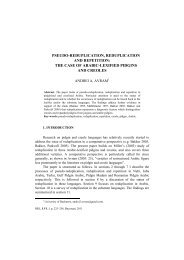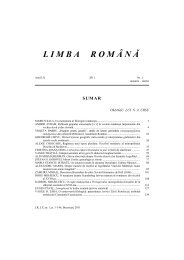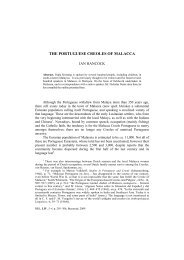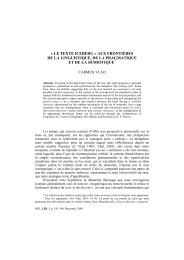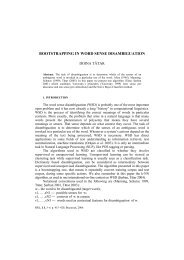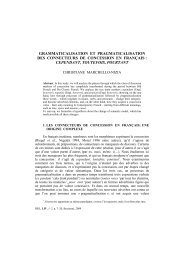'NOTHING' OR 'ANYTHING': TERMS IN IRISH AND SCOTTISH ...
'NOTHING' OR 'ANYTHING': TERMS IN IRISH AND SCOTTISH ...
'NOTHING' OR 'ANYTHING': TERMS IN IRISH AND SCOTTISH ...
Create successful ePaper yourself
Turn your PDF publications into a flip-book with our unique Google optimized e-Paper software.
‘NOTH<strong>IN</strong>G’ <strong>OR</strong> ‘ANYTH<strong>IN</strong>G’:<strong>TERMS</strong> <strong>IN</strong> <strong>IRISH</strong> <strong>AND</strong> <strong>SCOTTISH</strong> GAELICSEOSAMH WATSONAbstract. This paper constitutes an analysis of those terms which supply the concepts‘nothing’, ‘anything’, as employed in negative, interrogative or conditional statementsin the Gaelic branch of Celtic. The study, based on data published in the Linguisticatlas and survey of Irish dialects (1958-69) and supplemented by a small number ofadditional sources, categorises the results into 2 main classes. One of these consists ofinherited terms of diverse origins, such as pronominal and adjectival forms, while theother is based on human activity of various types, including the use of the senses,coinage and other measures, as well as movement and creativity generally. The termsin question may also be qualified by numerous adjectival or adverbial phrases – somequite striking – in the sense of ‘any, at all’. The picture which emerges serves toindicate the great range and variety of expression involved.0.1. The concepts of ‘nothing’, or ‘anything’, as employed in negative,interrogative or conditional statements, feature in a number of answers to the 1,180item questionnaire posed for Irish and Scottish Gaelic dialects in the 1950-60s bythe late Professor Heinrich Wagner. These data were published (together with dataexcerpted from an earlier source for the language of the Isle of Man (Manx) in volsii-iv of his Linguistic atlas and survey of Irish dialects (henceforth LASID). Theitems in question are reproduced at the end of the present article. It is proposed toanalyse here the nature of the terms employed by informants at the various LASIDpoints. There are 86 Irish points in the atlas, together with material from 3supplementary points, indicated by an ‘a’ following the numeral of the mainassociated point. Since, however, Wagner employed a reduced version of hisquestionnaire at a number of points and collected from only 7 points in GaelicScotland – none of these in the east of the country – it is intended to supplementthe overall material through the use of a small number of additional sources.(Those headwords taken from LASID are rendered here throughout in boldtypeface.) In the Gaelic dialects of Ireland, Scotland and the Isle of Man (seeFigure 1) the non-plural sense of ‘nothing’ or, in negative, interrogative orconditional or sentences, ‘anything’ may be rendered by means of one of a largenumber of lexemes. One method features a noun used with pronominal meaning 1 ,1 For a discussion of these forms, cf. Watson 2002.RRL, LIII, 1–2, p. 205–221 Bucureşti, 2008
ROCK STARDESIGN PACKTurn it up!CD041007KCStitches:56652.32" H X 3.02" W59 mm x 76 mmColor Stops:1 White Left dial [m1001]2 Black Left dial [m1000]3 White Middle dial [m1001]4 Black Middle dial [m1000]5 White Right dial [m1001]6 Black Right dial [m1000]7 Blue Box [m1166]8 Purple Text [m1112]Bass Guitar & SpeakerCD041007KDStitches:66152.17" H X 2.49" W55 mm x 63 mmColor Stops:1 Dk Grey Side [m1164]2 Brown Box [m1328]3 Grey Circles [m1118]4 Black Line [m1000]5 Dk Grey Top guitar [m1164]6 Dk Red Bottom base [m1181]7 Salmon Details [m1220]8 Olive Brown Details [m1308]9 Olive Green Details [m1140]10 Black Lines [m1000]www.starbirdstockdesigns.com 3
208Seosamh Watson 4the senses. The first of the categories to be dealt with consists of words which wemay say are loosely based on the sense of touch, inasmuch as the terms in questioninvolve spatial existence.2.1. dada, tada etc: by far the commonest collection of terms used in theentirety of the dialects under consideration comprises those in dad-, tad-, forms ofwhich occur in dialects of each of the Irish provinces considered, with comparableones being general in Scotland. The commonly accepted origin of the forms inquestion is that they derive from a learned medieval Lat. borrowing, atomus,Middle Irish adom[h], cf. LEIA (: D-7), to which an unhistorical initial dental hasbeen prefixed. Forms with this initial d- are found in LASID materials in the Irishprovinces from south to north in the following proportions: Munster 12; Connacht60; Ulster 34. The Gaelic system of initial mutations 3 has worked analogically onthe form in question, giving rise to a separate form in initial t-. The westernprovince, Connacht, appears to be the focus for this form where LASID records noless than 97 instances, while Munster shows a single case and Ulster, like Scotland,has none at all. Dad- forms have evolved final [i], or [u], either as reinforcement offinal unstressed –a or by analogy with substantival morphology – though the [u]may possibly represent original –amh – while those in tad- have likewise final [´]or [i]. The latter forms are recorded in LASID without accompanying qualification– though de Bhaldraithe (1959: 480) cites tada ar bith – whereas those given inLASID for dad- may be preceded by aon, or succeeded by ar chor ar bith ‘at all’(lit. ‘under any condition’).2.2. rud: the second major term in this category involves the modern reflex,rud, of Early Irish rét ‘wealth, possession’, cf. Sk rátnam ‘riches’, LEAI (: R-22).This is either qualified by preceding aon, or following ar bith/ sam bith. InConnacht and Munster the phrase can be completed by the adjective beo ‘alive’ asa further qualification, while in northern Irish dialects the qualification may beextended by cothrom, indicating ‘just, fair’. Rud is also familiar in the modernlanguages in a quasi-pronominal sense ‘which’, which introduces relative clauses.As elements of this type are less prominent in terms of sentence stress, such usagemay well account for the loss of historical vowel length and quality in the case ofthis word. Expressions signifying ‘anything, nothing’ in which rud figures arecommon in all three Irish provinces, as also in Scottish Gaelic and Manx. Theproportions in Ireland in the LASID materials in this instance are: Munster 19;Connacht 50; Ulster 13.3 For details concerning the operation of these mutations, see Watson (1997).
210Seosamh Watson 6Scotland, since there is an instance recorded in an eastern dialect (Dorian 1978:101) in the phrase cha d’ith mi pic [sic] ‘didn’t eat anything’.2.5.2. bit: unrecorded in LASID but well-known from other sources, are anumber of further terms which should be mentioned. Some of these are fairlyrestricted in distribution and a few are English loanwords. The first of these, aborrowing from English bit, appears in a number of Scottish dialects, cf.Wentworth (2003: 26).2.6. fríd: ‘tiny amount, trace’, cf. Ó Dónaill (1977: 581) fríd an gháire ‘faintsmile’, lit. ‘trace of the smile’. This form, whose alternative and original meaningwas a ‘flesh-worm’, is mainly found in the gen. as a qualifier of some of the otherterms cited here, cf. 3.2, 6.4.1, so as to denote a still smaller amount. However, itdoes also occur independently with oiread ‘amount’ in the phrase oiread na fríde‘the amount of a mite, cf. McKenna (1935: 893) and Ó Dónaill (1977: 581). Thecorresponding Early Irish form of the word is frigit ‘flesh-worm’ for whichMacBain (1982: 181) would propose a connection with the same IE root asEnglish wriggle.2.7.1. giob: a similar usage noted for the south and west by McKenna (1935:108) involves this word in the sense of ‘[not a] stitch of clothes’. The lexeme inquestion is related to gioball ‘rag’ and is probably to be referred to Early Irish gob‘beak’ (without etymology, but cf. Dan. gab ‘mouth’), hence a ‘shredded item’.2.7.2. luid: within the same semantic field lies a word recorded by bothMcKenna (1935: 108) in the sense of ‘nothing’ with reference to ‘money, clothesetc’ and also by Lane (1922: 1088) in the expression oiread na luide (lit. ‘theamount of nothing’) referring to clothing. Luid appears to be the word whichsignifies, both in Irish and Scottish Gaelic, a ‘rag’. Its etymology seems bestregarded at present as undemonstrated, since MacBain’s (1982: 236) suggestionslinking it to the same root as Gk λύω etc do not appear to be substantiated.2.8. heat: this term is recorded for a north-western Scottish dialect byWentworth (2003: 27). Its usage appears to be in the context of ‘not achievinganything’. The word in question is known to be Scots, cf. DSL (: s.v. haet) andoriginates in the substantivisation of the verbal phrase ha’ it, abbreviated from([Let] the Devil) have it! It is, thus, comparable in origin and development toEnglish damn ‘nothing’, cf. damn it! > a damned thing > a damn!2.9.1. pingin: Early Irish pinginn, is a borrowing from Old English penning,English penny, cf. LEIA (: P-9). The term in this case, as noted from a Connacht
7 ‛Nothing’ or ‛anything’: terms in Irish and Scottish Gaelic 211dialect, 4 has the sense of ‘getting nothing’, and makes reference to a unit of coinagestill employed in the United Kingdom and also used in Ireland prior to theintroduction of the euro in 2001.2.9.2. ás: this word is cited by Dinneen (1927: s.v.) in two instances, onewithout attribution, and the other from a 19 th cent. Connacht source, where itoccurs in the phrase ás ar bith, in the context of ‘gaining (nothing at all)’. Thelatter is also given by Lane (1922: 1089). The term, also known from 18 th cent.Ulster vernacular poetry, is clearly a borrowing of English ace, which itself derivesfrom Old Fr. ace ‘unity’, based on Lat. as, the Roman copper coin.2.9.3. bonn: this term is cited by Lane (1922: 1088) in the expression nílbonn screas[a] aige with the meaning ‘he has not (a scraped coin’, i.e.) anything.Bonn, a common term for ‘coin’, perhaps from Lat. pundus, according to MacBain(1982: s.v.), is here qualified by the gen. of verbal noun scrios ‘to destroy, scrape’,the derivation of whose verb stem, Early Irish sceirt-, is obscure, but for which aconnection with English squirt has been proposed, cf. LEIA (: S-39).2.9.4. sciúrtóg: this is recorded (as sciurtóg) by McKenna (1935: 894) withthe meaning of (having) nothing of monetary value. The word in question falls,likewise, into the category of coinage, since the basic reference is to a ‘valuelesscoin’. It is, moreover, recorded as a ‘coin of little value’ by Ó Muirithe (1996: 169)for an English dialect of N. Connacht. Dinneen (1927: s.v.) cites it in ConnachtIrish as being a coin to the value of a quarter of the lowest denomination of coinagein use in Ireland in the early 20 th century and derives it from sciorta (from Englishskirt) ‘skirt, border, edge’. The implication here would be that the coin in questionhas been trimmed of some of its value. An alternative etymology, however, couldconnect it with sciúr ‘to scour, scrub’.2.9.5. screapall: this is a term which is noted by McKenna (1935: 108) foreach of the Irish provinces. The sense given is of ‘not (possessing/ asking for)monetary possessions’ and, no doubt, as in the case of pinginn (2.6.2), thereference is to a measure now obsolete. Ó Muirithe (1996: 172), cites the variantform sgreatall for Munster, as does Lane (1922: 1088) in the expanded versionsgreatal na ngrás, lit. ‘of grace(s), i.e. ‘not a blessed thing’. Ó Dónaill (1977:1064) selects screatall as standardised form with the meaning in question andunder screapall one is referred to another variant (: 1063), namely screaball whichhas the sense of ‘tiny bit, morsel, shred’, though, unlike under screatall, noillustrations of negative sentences are provided. The origin of the terms in question,is Lat. scripulus, (DEL: s.v. scrūpus) borrowed into Early Irish as screpul, also4 I am grateful to my colleague and friend, Prof. Séamas Ó Catháin, UCD Delargy Centre forIrish Folklore and the National Folklore Collection, for this information.
212Seosamh Watson 8screbull, cf. LEIA (: S-53-4) signifying one twenty-fourth of an ounce, cf. Kelly(2000: 584).3.0. The second category to be discussed in this class pertains to the sense ofsight and the number of terms in this particular section which have becomegeneralised in their usage is noteworthy.3.1.1. dath: the basic meaning of this first term is ‘colour’, Early Irish dath,‘colour, flash’, cf. Lat. fax, facis ‘torch, flame’, cf. LEIA (: D-26). This word mayhave come into prominence in expressions of the kind being discussed on accountof its phonetic similarity to dada (see above 3.1). As an expression it isparticularly favoured by the northern Irish province (Ulster) where LASID cites 68instances, with only 2 from Connacht and none each from either Munster orScotland. It is often preceded by a which may either represent the poss. adj.referred to previously or, alternatively, represent a reduced form of the numeralaon (cf. Wagner 1959: 216). Whether or not preceded by a, it can be qualified arbith/ ar chor ar bith with the sense of ‘at all’, but is not so qualified when precededby an unreduced form of the numeral. The system of initial consonant mutations,referred to at 3.1, has led to variant forms in initial g-, e.g. gath, whiledevelopments in the vowel quality of the word have resulted in forms withpalatalised initial, viz. geath, gheath. McKenna’s dictionary (1935: 45) records theexpanded forms a dhubh ná a dhath, dubh ná dath, lit. ‘its black or colour’, as wellas similar variants as being typical of Connacht or Munster dialects, while Lane(1922: 1088) cites an instance of the heightened poetic expression dath na ríoghruadh (lit. ‘the ruddy kings’ colour’).3.1.2. lí: this word is recorded by McKenna (1935: 45, 108) for Connacht andMunster in the phrase lí na léithe with the sense ‘nothing (left)’, lit. ‘the colour ofgreyness’, as well as lí léithe for Connacht (: 894), cf. also Ó Dónaill (1977: 781),ní raibh lí na léithe agam ‘I had not the slightest thing’. Lane (1922: 1088) recordsan alternative expression ní raibh lí lé ortha ‘there wasn’t the least thing on them’,with reference to clothing. Lí is referred by Lewis and Pedersen (1961: 7) to Lat.līuor, while MacBain (1982: 228) connects liath ‘grey’, from which the abstractnoun léithe derives, with Sk. palitáh ‘grey (through age)’ and Lat. pallidus, cf.palleō (DEL: s.v.) to be connected with terms signifying ‘pale, pale-blue’ in I-Elanguages, e.g. Old Slav. plavŭ ‘λευκός’.3.2. ceo: with the literal meaning of ‘mist’, Early Irish ceó ‘fog, mist’, cf.Goth. hiwi ‘appearance, Old English héow, híw ‘appearance, face, colour’, LEIA (:C-68-9) and qualified by aon or ar bith, is an expression found in Connacht alonein the LASID materials. Ceó may be related to the adj. cía ‘dark brown’, cf. LEIA
9 ‛Nothing’ or ‛anything’: terms in Irish and Scottish Gaelic 213(: C-69, 95) with connections to the same I-E root as Old English hár ‘grey’. Theword is found at a number of points in the western province and LASID furnishesus with no less than 19 instances from dialects of the western province. McKenna’sdictionary (1935: 107) shows this (along with by-form sceo) and usage citedincludes ‘eating,’ and ‘doing’. With reference to sight only, apparently, the samesource (: 893) quotes an expanded form from Connacht and Ulster beo ná ceo, lit.‘living being nor mist’. The same source also notes that that ceo, like faic (v. 6.4)can also be qualified through the addition of the substantive phrase na fríde (v. 2.6)lit. ‘[to the degree] of a (the) mite’.3.3. seó: the English loan-word show in the sense of ‘spectacle’ as found inthe expression aon seó puts in an appearance in a context without reference to‘seeing’ at a single LASID point in Connacht.3.4.1. leus: the lexical collection from a north-western Scottish dialectpreviously referred to furnishes our two final examples in this category. The firstof these is leus ‘light, blaze’ (Wentworth 2003: 790). It is used exclusively in thisinstance with reference to sight. The Early Irish form in question is lés for which aconnection to Old Norse ljós has been proposed, cf. DIL (s.v.lés).3.4.2. poidhs: similarly restricted to the sense of ‘anything, nothing’ withregard to vision is the word given orthographically in the collection as poidhs(Wentworth 2003: 790). I have encountered the same word in a similar context in arelated eastern Scottish dialect during fieldwork and would suggest that it mayrepresent a by-form of foillse ‘light, manifestation’, as cited by Dwelly (1977: 446)from Armstrong’s dictionary. The initial consonant would have been alteredthrough hypercorrection resulting from the effects of the system of initial mutations(see above 3.1). Foillse is in origin the abstract noun of adj. folas, Early Irish follus‘clear’ < *fo-ׁsolus, based on solus ‘light’, which LEIA (: S-169) analyses as acompound of *su- ‘good, well’ and lés, v 3.4.1 above). Lewis and Pedersen (1961:104), however, would derive solus from *su- and *luks-, in respect of which cf.Lat. lūx, Gk λευκό, Sk. ruc-, Old English leōt.3.4.3. scaile: also to be included here, it would seem, is another termrecorded in McKenna (1935: 893) where it is used to signify ‘nothing’ withreference to news, information or doing a piece of work. It is listed here on thebasis that the word in question is scal (gen. scaile) a ‘burst, flash’, which thepalatal final would render likely, cf. also Scottish sgail ‘splendour, brightness;flash, flame’, obsolete according to Dwelly (1977: 812). On the other hand, thepossibility should not be ruled out that the word is, in origin, a variant of EarlyIrish caile ‘spot’.
214Seosamh Watson 103.5. steama: the concluding item of this section is recorded in the collectionfrom a north-western Scottish dialect made by Wentworth (2003: 27, 525), where itis used in the sense of ‘not (achieving) anything’. The non-Gaelic dental stop inthe source in question indicates unequivocally the foreign origin of the term and itsorigin is clearly the Scots word stime, cf. SND (: s.v.), with variants stym(e),stem(e), which apparently developed in this language from the sense, in negativesentences, of ‘(not being able to see) anything’ which developed, via the meaningof a ‘least visible appearance’, to signifying more generally ‘the least particle ofanything, a jot or atom’. The word in question may possibly be connected with thesimilar Scots form stim ‘haze, mist, e.g. on the sea’ which is referred by the samesource to Swedish dialectal stimba, stimma ‘steam, fog’.4.0. The next category arises from the sense of hearing.4.1. sian: this, together with the following entry, would appear to be the onlyterms whose use has been extended beyond the semantic range indicating‘hearing’. In the sense of ‘anything, nothing’ the word is usually spelt sìon inScottish Gaelic. As such, it has been recorded at 2 locations in LASID, but isattested to in a number of other dialects also. Wentworth (2003: 755), for example,quotes chan fhaigh thu sraing air sìon ‘you won’t get string for nothing’. Thespelling sìon connects the word in question to a lexeme signifying ‘weather’, whichis MacBain’s (1982: 324) preferred etymology. In my view, however, the sense of‘scream, shriek’ and, by extension, ‘voice’, cf. related Irish siansa ‘strain, melody’,siansán ‘humming, whistling; cry, clamour’, provides a preferable point ofdeparture for the development in question, especially in view of the similar usageinvolved with seinm, dùrd, etc below. The Early Irish form sian ‘chant, musicalair’ from which the word in question derives has no established etymology.4.2. seinm: in connection with the foregoing item it is perhaps worth quotingthe single instance of the semantically related form seinm, whose basic sense is‘playing (music)’, which is recorded in LASID. Seinm ar bith is returned for aConnacht dialect as a response in the context of ‘(doing) anything’. This is theverbal noun of seinn ‘play’, Early Irish senn-, which MacBain (1982: s.v. seinn)connects with the same IE root as Lat sonus.4.3. guth: the remaining terms are restricted to express the meaning only of‘hearing anything/ nothing’. The first of these is guth ‘voice’, hence ‘sound’.LASID has a listing for this at two Scottish points, Wentworth (2003: 27) notes it inhis collection and it is also familiar to me in this same sense from a related easterndialect. Lane (1922: 1089) notes its use in Ireland also in the phrase níor chualas
11 ‛Nothing’ or ‛anything’: terms in Irish and Scottish Gaelic 215guth dhe ‘I didn’t hear word of it’, which is to be connected with the usage cited byÓ Dónaill (1977: 680) fuaireamar an guth ‘we got (the) word’ [i.e. message]. TheEarly Irish form guth ‘voice’ has no generally accepted etymology.4.4. dùrd: this word which signified originally ‘humming’ has come to mean‘sound’ or ‘word’ in a number of Scottish dialects and, although not listed byLASID in the sense of (‘hearing) not a/ any word’, this is a meaning recorded byWentworth (2003: 790) in his dialect study and one which is likewise very familiarto me from a neighbouring eastern variety of Scottish Gaelic. For Irish, Lane(1922: 1088) lists, with reference to speech, the expression níor labhair sé drud (nódruid) ‘he didn’t utter [a syllable or sound]’, where the latter two substantives areevidently variant forms of the common Modern Irish dord, ‘drone, hum, murmur;(deep) chant; bass’, corresponding to Early Irish dórd. LEIA (: D-175-6) refers thelatter to an IE root *der-, with connections such as Hesychius δάρδα ‘bee’.4.5. focal: information for a N. Connacht 5 dialect indicates the use of thisword to signify ‘nothing’ solely with reference to speech This usage is confirmedin both McKenna’s (1935: 894) and de Bhaldraithe’s dictionaries (1959: 480). It isgenerally regarded as a loanword deriving from a Lat. source in voc-.4.6. puth: the basis significance of this word is ‘puff’ and it is known in thissense in Irish and Scottish dialects. It is recorded by Dorian (1978: 101) for aneastern mainland dialect of Scotland as ‘nothing’ in the context of hearing. As tothe origin of the word, it may very likely be a borrowing from English puff, thoughit could also have arisen independently on an onomatopoeic basis.4.7. diog: this word, though not familiar to me in the sense in question is,however, cited by Wentworth (2003: 525) with the meaning ‘anything, nothing’ inrelation to the action of an item of machinery. It is clearly a borrowing fromEnglish, cf. tick (as of a clock), with which signification also it is used in thedialect referred to.4.8. cneadadh: from N.W. Scotland, Wentworth (2003: 27) comes thisinstance of a particular term used exclusively with reference to having an ailment.Itself a verbal noun, of cnead ‘groan, sigh, moan’, cneadadh is employed as objectof the verbal noun of fairich ‘feel’. For the Early Irish substantive cnet ‘sigh,moan’ a connection has been posited, cf. LEIA (: C-131), with Sk. kiknasa ‘crushed’5 Information from Prof. Séamas Ó Catháin.
216Seosamh Watson 125.0. The final category connected to the senses is that of taste.5.1. blas: the only instance within this category that LASID provides is blas‘taste’, qualified by aon or ar bith and not restricted, as confirmed by McKenna(1935: 893), to food. Again the focus is the western Irish province of Connachtwith 5 examples from 4 atlas points. The distribution is comparable to that of ceo,except that it is even more limited. The Early Irish form of this word is mlas, withwhich the only connections, cf. LEIA (: M-56) would appear to be Slavic forms, cf.Rus. molsātĭ ‘suck’, Czech mlsati ‘taste’.5.2. gráinne: this form is cited in the sense of ‘none’ by McKenna (1935: 45)with reference, it would seem, to solid foodstuffs such as tea. The correspondingScottish Gaelic form gràine is widely used in a generalised sense of ‘a tiny amount,a few’, negative ‘not a pick’, cf. Wentworth (2003: 74) cha robh gràine rifhaighinn ‘there wasn’t a bit to be had’. The Early Irish form gráinde ‘cerealgrain’,cf. Kelly (2000: 560-1) constitutes a singulative form of grán, itself aborrowing from Lat. grānum.5.3.1. greim: de Bhaldraithe (1959: 480) cites this word with the meaning of‘not (eating) a bite’. The word is, of course, common in Ireland and Scotland inthe sense of a ‘bite’. For the Early Irish is greim(m) with the basic sense of a ‘hold,grip’, cf. perhaps Goth. greipan, ON grípa, Buck (1949: 744-7).5.3.2. smailc: this is recorded by McKenna (1935: 893) for Munster in thesense of nothing being ar ‘on’, i.e. wrong with, someone (cf. 2.3.2). The samesource also notes the use of ceo (3.2) in this sense. The basic sense of the word is a‘bite, mouthful’, for it has also been recorded in use in a N. Connacht dialect 6signifying ‘nothing’ with reference to eating, while in a neighbouring dialect ofEnglish, cf. Ó Muirithe (1996: 181) the verb smailc signifies to ‘eat voraciously’.This verb can also be used in the latter dialect, as in dialects of Irish, in the sense ofto ‘smack’, as of children, a connection which brings into question the possibilityof its being an English loanword in origin. McKenna also gives an expandedversion, namely smailc ná smáil, the final word here, standard smál. Early Irishsmál, smól, whose etymology is unclear, appears to have a primary sense of ‘fire,blaze’ cf. LEIA (: S-140).5.4. deoir: McKenna cites this word (1935: 45, deor) for Connacht andMunster as signifying ‘none’ with reference to drinking, which, of course, parallelsthe use of greim (v 5.3.1) to signify the smallest amount possible of solid food. TheEarly Irish form is dér ‘tear, drop’, for which a common origin is cited, cf. LEIA(: D-54-5) with Goth. tagr ‘tear’ etc.6 Informant of Prof. Séamas Ó Catháin’s.
13 ‛Nothing’ or ‛anything’: terms in Irish and Scottish Gaelic 2176.0. The last group is somewhat heterogeneous in nature, but most items areconnected with human activities, perceptions or the like.6.1. cáil: this is a term which may be categorised here. It is recorded in northeasternIrish dialects with the meaning of ‘quantity, amount’, while in Scotland,either alone or qualified by sam bith, it generally has the signification underdiscussion here, namely ‘any, none’. Ó Baoill (1978: 177-78) points out that a rareinstance of its use in this sense has been noted in Ulster, while an 18 th centuryScottish poet employs the word with the meaning commonly known in Ulster. Inregard to its derivation, as noted by the same scholar, the meaning ‘quantity,amount’ appears to have developed at a comparatively late stage, while the primarysense would appear to be that of ‘quality, characteristic’. It has, indeed, beensuggested, LEIA (: C-10), that the word in question may, in fact, be a loan-word,deriving ultimately from Lat. qualitas, and, in this connection, it is noteworthy thatone Ulster point in LASID does in fact supply an instance of a cháilíocht as asecondary response with the meaning of ‘any’, cf. 1.3 in this connection where theuse of cineál ‘type, kind’, in a LASID response from western Ireland is noted assignifying ‘anything, nothing’.6.2. cruthaitheachd: this is another term used to mean ‘anything, nothing’,which is recorded for a single point among the LASID data for Scotland. The basicsense is ‘creation, creativity’, hence ‘activity’ and the context of the atlas questionis, appropriately enough, ‘doing’. The substantive in question is based on EarlyIrish cruth, for which LEIA (: C-256-7) proposes an IE root *k w er- ‘to make,shape’, cf. Sk. karō⁄ti, ‘makes, accomplishes’, Lith. kùrti ‘makes, builds’.6.3. tarbha: (standard form tairbhe) may also be considered here. This is aform noted by me from an eastern mainland Scottish dialect. The basic meaning is‘profit, advantage’ and its use in the expression in question may have derived fromsuch idiomatic and proverbial usages as nithe gun tairbhe ‘things without profit’,or an t-ainm gun an tairbhe ‘the name or credit (of anything) without the profit’(i.e. benefit of it), Dwelly (1977: 925). In the expression under discussion tarbhamay be qualified by the adverb idir ‘at all’ (historically the 3 sg. m. pronominalform of the preposition idir ‘between’, thus ‘between, i.e. within, it’, cf. modernidioms involving the equivalent form of de ‘of it’, cf. Wentworth (2003: 525 s.vnothing but). Modern tarbha is a reflex of Middle Irish tarba, cf. Early Irish torbe,which itself derives from a verbal complex such as *to-for-ben ‘to profit’,originally involving a form of the substantive verb.6.4.1. faic(e): a major item for consideration in this section is one which hasa number of LASID entries throughout the south and west of Ireland (Munster andConnacht) respectively. In the former province it is listed in 14 separate entries,while in the latter it appears 5 times. In Munster it may be qualified by in aon chor
218Seosamh Watson 14‘at all’, lit. ‘in any condition’, and there are two Connacht examples of a form infinal -e, which probably derives from an oblique case form. Though not soqualified in the LASID examples, faic, as is well known, can also be qualifiedthrough the addition of the substantive phrase na fríde (see above 2.6). Thehistorical corpus of Irish, CG, (1600-1882), documents no instances of faic(e)before the late 17 th century which makes likely the suggestion that the word is aloan-word derived from English whack. Although its use in expressions of the typeunder consideration is not restricted to phrases involving ‘doing, making’, its originin the idea of a ‘blow’ or ‘stroke’ would be similar to the familiar phrase stróicoibre ‘a stroke of work’, cf. Ó Dónaill (1977: 1173) in which the first term is aborrowing from English stroke). This phrase is common in modern colloquial Irish.The following item also should be considered in the same semantic range.6.4.2. tap: this term, which is clearly from English tap, has been recorded ina N. Connacht 7 dialect with reference to ‘doing’. It would seem likely that its entryinto Irish was based on a familiarity with the English expression ‘not (doing) a tap(of work)’.6.4.3. car: this word is recorded in the sense of ‘nothing’ in the context of‘doing’ in Scottish Gaelic, cf. Dwelly (1977: 167) cha robh car air an t-saoghal‘there was nothing at all’, lit. ‘in the world’, cf. air/ sam bith (v. 1.1.1), although itdoes not feature in LASID. In the modern language it signifies, among other things,a ‘turn, spell of work’, cf. gabh car! ‘take a turn!’. The corresponding Middle Irishform is cor ‘state, condition’, which is to be referred to the verb cuir ‘put’, EarlyIrish stem cuir-. To the same IE root from which the latter may derive have beencompared forms such as Gk σκαίρω ‘dance’, OSl. skorǔ ‘fast’. Cor is, of course,the word which appears in the qualifying adverbial expressions already referred tomeaning ‘at all’ which are noted above at various points, namely ar chor bith, andin aon chor. However, the Scottish expression here discussed does not appear inIrish sources and relates firmly to the notion of a ‘turn of work’ in the latter language.6.5.1. fionna-feanna: one most interesting instance to be included in thiscategory is again obtained from Lane (1922: 1089) and McKenna (1935: 893). Thelatter, who provides most information, cites it for Connacht in two senses: (i) ‘notto leave a bit’; and (ii) ‘not to have (a tap) of work to do’. Lane quotes the secondsense with the fuller spelling fionnadh feannadh. The second word here is clearlythe verbal noun of feann ‘to skin, flay’ preceded by the related noun fionnadh ‘fur’,cf. the common English idiom ‘to be skint’. Both are connected via the notion of‘perception’, hence ‘surface [appearance]’, to Early Irish fiss ‘knowledge’, cf. Latvideo, Gk ιδει)ν McKenna also provides a variant fionnafeanc, where the latterelement would have been influenced by faic(e) (v. 6.4.1).7 Information supplied by Prof. Ó Catháin.
15 ‛Nothing’ or ‛anything’: terms in Irish and Scottish Gaelic 2196.5.2. folt: this term, also found in McKenna (1935: 893), is noted by him forMunster where this word, signifying ‘(head of) hair’, is employed in expressionssignifying ‘anything, nothing’. This usage clearly lies within the same semanticrange as the preceding, since fionnadh may also refer to human hair. According toMacBain (1982: 162), Early Irish folt is to be connected to Lat. vellus ‘fleece’ lāna‘wool’, etc.
220Seosamh Watson 16APPENDIX 1Items from LASID containing terms ‘anything, nothing’34 I would not chew tobacco if I got it for nothing.74bWe don’t need anything.279 We do not get (any money).280 He would not get (anything).281 He did not get (anything).305 I shall eat whatever you will give me.306 I didn’t eat anything today because I was sick.965 I know nothing about him.996 He does nothing at all.1008 Nothing is troubling him.1027 He didn’t say (anything).1028 Did he say (anything)?1040 I didn’t do anythingREFERENCESBuck, C. D., 1949, A dictionary of selected synonyms in the principal Indo-European languages,Chicago.CG: Ú.M. Uí Bheirn (ed.), 2004, [CD-ROM] Corpas na Gaeilge 1600-1882/ The Irish languagecorpus, Dublin.de Bhaldraithe, T., 1959, English-Irish dictionary, Dublin.DEL: E. Ernout, A. Meillet (1951, 3 rd ed.), Dictionnaire étymologique de la langue latine, Paris.DIL, 1913-76, Royal Irish Academy. (Contributions to a) Dictionary of the Irish language, Dublin.Dinneen, P.S., S.J., 1927, Foclóir Gaedhilge agus Béarla: an Irish-English dictionary, Dublin.Dorian, N.C., 1978, East Sutherland Gaelic: the dialect of Brora, Golspie, and Embo fishingcommunities, Dublin.Dwelly, E., 1977, 9 th edition, The illustrated Gaelic-English dictionary, Glasgow.Kelly, F., 2000, Early Irish farming, Dublin.Lane, T. O’N., 1922, Larger English-Irish dictionary, Dublin.LASID, 1958-66, H. H. Wagner, Linguistic atlas and survey of Irish dialects.vols 1-3, Dublin; (1969)Wagner, H. H. and Ó Baoill, C. vol. 4. Dublin.LEIA: J. Vendryes, E. Bachellery, P.-Y. Lambert, (eds.), 1959-96, Lexique étymologique del’irlandais ancient, Dublin and Paris.Lewis, H., H. Pedersen (eds.), 1961, A Comparative Celtic grammar, Göttingen.MacBain, A., 1911 revised edition, reprinted 1982, An etymological dictionary of the Gaeliclanguage, Glasgow.McCone, K. et al (eds), 1994, Stair na Gaeilge Maigh Nuad.McKenna, L., S.J., 1935, Foclóir Béarla agus Gaedhilge, Dublin.Ó Baoill, C., 1978, Contributions to a comparative study of Ulster Irish and Scottish Gaelic, Belfast.Ó Cuív, B., 1944, The Irish of west Muskerry, Co. Cork, Dublin.Ó Dónaill, N., 1977, Foclóir Gaeilge-Béarla, [Dublin], Báile Átha Cliath.Ó Muirithe, D., 1996, A dictionary of Anglo-Irish: words and phrases from Gaelic in the English ofIreland, Dublin.Ó Murchú, M., 1989, East Perthshire Gaelic: social history, phonology, texts and lexicon, Dublin.O’Rahilly, T. F., 1972, ed. by Ó Cuív, B., Irish dialects past and present, Dublin.
17 ‛Nothing’ or ‛anything’: terms in Irish and Scottish Gaelic 221SND: W. Grant, D. D. Murison (eds.), 1956, vol. 4; 1974, vol. 9. The Scottish national dictionary.Edinburgh.Thurneysen, R.,1961, revised ed., Grammar of Old Irish, Dublin.Wagner, H. H., 1959, Gaeilge Theilinn, [Dublin], Baile Áthe Cliath.Watson, S., 1984, “Séamus Ó Duillearga's Antrim Notebooks”, Zeitschrift für celtische Philologie,40, 74–117.Watson, S., 1997, “Aspects of the adaptation of loan-words in Gaelic”, Zeitschrift für Dialektologieund Linguistik, 97, 428–37.Watson, S., 2000, “The personal numeral category in the Goidelic branch of Celtic”, Dialectologia etGeolinguistica, 8, 69–80.Watson, S., 2002, “Uimhreacha pearsanta sa Ghaeilge”, in: P. Ó hÉalaí, M. Ó Briain (eds.), Téadadúchais: aistí in ómós don Ollamh Breandán Ó Madagáin, Conamara, 549–564.Wentworth, R., 2003, Gaelic words and phrases from Wester Ross/ Faclan is abairtean à Ros an Iar,Inverness.


